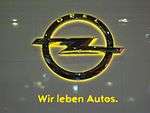Easytronic
| Transmission types |
|---|
| Manual |
| Automatic |
| Bicycle gearing |
Easytronic is the Opel tradename for a type of transaxle-based semi-automatic transmission or gearbox, as used in some Opel/Vauxhall cars.
Easytronic is not a tiptronic gearbox design; it does not have a torque converter. It is fundamentally a conventional manual transmission, with a single-plate dry clutch. The transmission is controlled by an electronic control unit (ECU).
The Easytronic is generally used in smaller modern front-wheel drive cars, including the Corsa 1.0 & 1.2 & 1.3D, Tigra 1.4 90 ps, Meriva 1.6 & 1.8, Astra 1.4 & 1.6, Zafira 1.8 140 ps and Vectra/Signum 1.8 140 ps.
The Easytronic transmission is manufactured for Adam Opel AG by ZF Friedrichshafen AG.[1]
The Easytronic system allows for a computer to assume control of the manual gearbox and clutch via electromechanical means.[2] As of Easytronic 3.0,[3] the gearbox can be operated in either full automatic, or sequential semi-automatic mode. In the former, the car behaves much like a traditional automatic transmission, selecting gears with no driver input; in the latter, the gears can be selected sequentially (using the gear select lever) by the driver. It also offers a traditional automatic-like 'creep' mode[4] for low-speed maneuvering.
Opel's Easytronic is advertised as a low-cost alternative to a traditional automatic transmission for city drivers.[5]
See also
References
- ↑ "Powertrain - transmissions: Shift in power to the gearbox" (PDF). AMS. UnofficialBMW.com. September–October 2003. Retrieved 31 October 2009.
- ↑ http://www.zf.com/corporate/en_de/products/product_range/cars/cars_automated_manual_transmission.shtml
- ↑ http://media.opel.com/media/intl/en/opel/news.detail.html/content/Pages/news/intl/en/2016/opel/03-16-automated-manual-transmissions.html
- ↑ http://www.carscoops.com/2016/03/opel-adds-affordable-easytronic-30.html
- ↑ http://media.opel.com/media/intl/en/opel/news.detail.html/content/Pages/news/intl/en/2016/opel/03-16-automated-manual-transmissions.html
